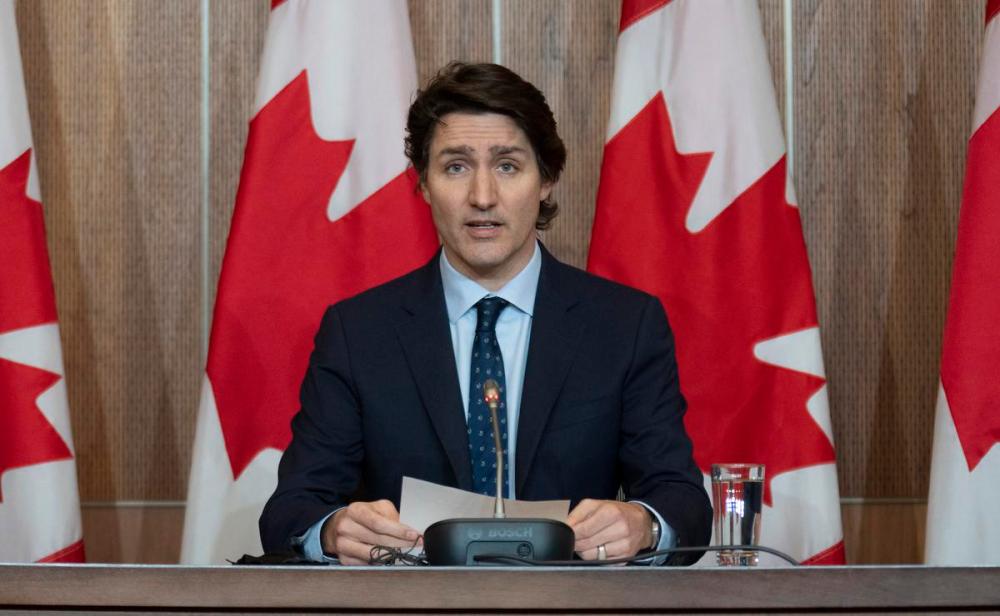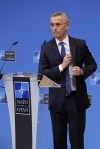Justin Trudeau unveils new sanctions targeting Russia’s elites and Putin’s inner circle
Advertisement
Read this article for free:
or
Already have an account? Log in here »
To continue reading, please subscribe:
Monthly Digital Subscription
$0 for the first 4 weeks*
- Enjoy unlimited reading on winnipegfreepress.com
- Read the E-Edition, our digital replica newspaper
- Access News Break, our award-winning app
- Play interactive puzzles
*No charge for 4 weeks then price increases to the regular rate of $19.00 plus GST every four weeks. Offer available to new and qualified returning subscribers only. Cancel any time.
Monthly Digital Subscription
$4.75/week*
- Enjoy unlimited reading on winnipegfreepress.com
- Read the E-Edition, our digital replica newspaper
- Access News Break, our award-winning app
- Play interactive puzzles
*Billed as $19 plus GST every four weeks. Cancel any time.
To continue reading, please subscribe:
Add Free Press access to your Brandon Sun subscription for only an additional
$1 for the first 4 weeks*
*Your next subscription payment will increase by $1.00 and you will be charged $16.99 plus GST for four weeks. After four weeks, your payment will increase to $23.99 plus GST every four weeks.
Read unlimited articles for free today:
or
Already have an account? Log in here »
Hey there, time traveller!
This article was published 24/02/2022 (1384 days ago), so information in it may no longer be current.
OTTAWA—The Trudeau government blasted Russia’s invasion of Ukraine as a grave threat to the world order Canadians fought and died to create, as it laid out new and more aggressive sanctions, and warned more penalties could cut Russia out of the global financial system and take direct aim at President Vladimir Putin.
Canada, acting in concert with the United States, United Kingdom, and other European and G7 allies, announced its second round of sanctions this week in response to what Prime Minister Justin Trudeau called “the greatest threat to European stability” since the Second World War: a “horrific, unprovoked attack” on a sovereign country that violated international law and spawned human suffering as missiles fell on Kyiv, the Ukrainian capital.
Ottawa outlined moves to penalize 31 individuals and 27 banks and entities all connected to Russia’s ruling elite, to curb about $750 million in Canadian exports particularly of aerospace, IT and mineral shipments to Russia, and to bar any dealings with several Russian financial institutions.

However the federal Liberal government and its other allies including the U.S. did not immediately move to cut Russia out of the SWIFT global financial transaction system, target Putin outright or his top foreign deputy Sergei Lavrov, or hit Moscow’s ability to raise money by banning Russian oil and gas exports — although the prime minister and his key cabinet member said all options are on the table.
One option that is not on the table, however, according to a top military commander, is sending Canadian troops into combat in Ukraine to defend against the Russian assault. U.S. troops will not be sent to Ukraine either, said U.S. President Joe Biden on Thursday.
“The simple answer is no,” said Vice-Admiral Bob Auchterlonie, commander of the Canadian Joint Operations Command. Defence Minister Anita Anand said another 3,400 Canadian Armed Forces personnel have been placed on alert ready to deploy in neighbouring countries as needed by NATO, the alliance set up during the Cold War to counter the Soviet Union in Europe.
Senior government sources say the U.S. and its allies cannot and will not be drawn into a superpower confrontation in Ukraine with a nuclear-armed Russia, although the U.S. and Canada made clear they will defend their NATO allies in the region.
Deputy Prime Minister Chrystia Freeland, who is among this country’s 1.4 million Ukranian-Canadians, said the invasion was “barbaric.”
“History will judge President Putin as harshly as the world condemns him today,” she said. “Today, he cements his place in the ranks of the reviled European dictators who caused such carnage in the 20th century.”
The latest sanctions unveiled Thursday target a total of 58 individuals, businesses, banks and a paramilitary group associated with Russia. Among the people blacklisted are members of the Russian elite, their families, and Putin lieutenants on his government’s security council: defence minister Sergey Shoygu, justice minister Konstantin Chuychenko, and finance minister Anton Siluanov. Missing was Putin’s top deputy Sergey Lavrov and Putin himself.
Biden said sanctioning Putin personally is under consideration.
The latest penalties were aimed at individuals and “really recognizing that this is basically a kleptocracy,” said a senior Canadian official, speaking on background. “This isn’t about crippling their industries, so much as it is (aimed) at personally impacting the ruling class that are making these decisions.” Other decisions will be made in co-ordination with allies in order to have maximum effect.
Foreign Affairs Minister Mélanie Joly called it “one of the strongest package of sanctions being released today.” Joly said she summoned Russian Ambassador Oleg Stepanov Thursday to make clear Canada’s demand that Russia stop its attack immediately and “return to the path of dialogue and diplomacy.”
“This madness has to stop,” Joly told reporters.
Meanwhile, Canada’s embassy personnel fled Ukraine in the hours after Russian forces swept into the country via land, sea and air.
Auchterlonie, the military commander, told reporters that all remaining Canadian soldiers — who had been conducting a training mission with the Ukrainian military — had left the country for Poland, and that the prospect for their return in the near term was “bleak.” The remaining 14 Canadian diplomatic staff have also left for Poland.
Consular services for people trying to flee the attacks can now be offered only from outside Ukraine’s borders, online or at border entry points.
Kerry Buck, who served as Canadian ambassador to NATO between 2015 and 2018, said in an interview that recent sanctions didn’t work to deter Putin from acting and “it’s clear now that he had already planned the most aggressive, most extreme path he could take. So those sanctions had no impact on him.”
But she said Thursday’s sanctions are “more punitive to be frank. It was a way of pulling him back from even more of aggression maybe but they’re also punitive. And they’re designed to create political pressure on him inside Russia” with the oligarchs “who keep most of their money offshore and send the kids to offshore universities.” Putin “needs them. They need him,” she said, calling it a “marriage of mutual assured destruction in a way. But you know, if they’re really hit, maybe that’ll do something.”
The Russian embassy on Wednesday vowed retaliation against Canada’s sanctions, “following the principle of reciprocity.”
“Russia’s recognition of the independence of the People’s Republics of Donetsk and Luhansk is irreversible,” the declaration said. The embassy did not reply to requests for comment Thursday.
Trudeau promised Canadians and permanent residents stranded in Ukraine that the government would help arrange “safe passage for you and your families at the land borders with Poland, Slovakia, Hungary, Romania, and Moldova.”
“We are urgently issuing travel documents for affected Canadians, permanent residents, and their immediate family members. We are also prioritizing immigration applications for Ukrainians who want to come to Canada,” Trudeau said.
Officials said later Canada will fast track applications for proof of citizenship for permanent residents and temporary residents, including study and work permits as well as essential grants for adopted children “on a prioritized basis.” An official said the federal government has set up a dedicated phone line (613-321-4243), which will accept collect calls, available both inside Canada and abroad.
The Conservative-led Official Opposition, which has harshly criticized the Trudeau government’s response to date as weak and insufficient, issued a statement of “solidarity” with Ukraine on Thursday, avoided direct criticism of the government before the sanctions were released, and did not comment after on the Canadian government’s actions.
Other opposition parties had earlier called on the government to significantly step up its regime of sanctions against Russia.
Before the sanctions were unveiled, NDP Leader Jagmeet Singh said Canada should do everything short of sending more weapons or troops to Ukraine.
Tonda MacCharles is an Ottawa-based reporter covering federal politics for the Star. Follow her on Twitter: @tondamacc
Alex Ballingall is an Ottawa-based reporter covering federal politics for the Star. Follow him on Twitter: @aballinga





